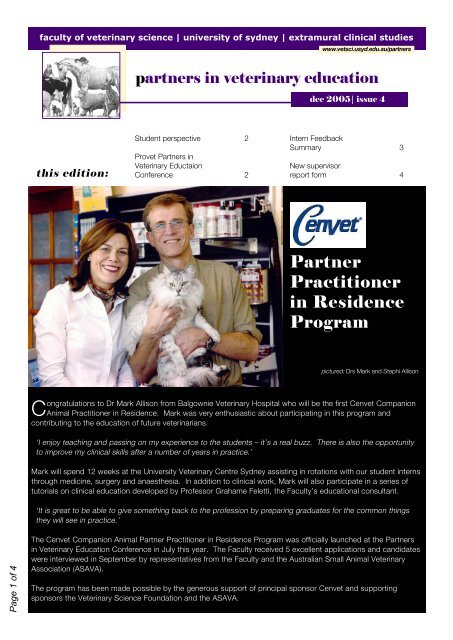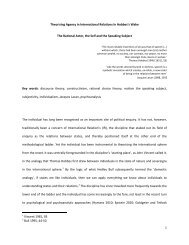December 2005 - The University of Sydney
December 2005 - The University of Sydney
December 2005 - The University of Sydney
Create successful ePaper yourself
Turn your PDF publications into a flip-book with our unique Google optimized e-Paper software.
Page 1 <strong>of</strong> 4<br />
faculty <strong>of</strong> veterinary science | university <strong>of</strong> sydney | extramural clinical studies<br />
this edition:<br />
www.vetsci.usyd.edu.au/partners<br />
partners in veterinary education<br />
Student perspective 2<br />
Provet Partners in<br />
Veterinary Eductaion<br />
Conference 2<br />
dec <strong>2005</strong>| issue 4<br />
Intern Feedback<br />
Summary 3<br />
New supervisor<br />
report form 4<br />
Partner<br />
Practitioner<br />
in Residence<br />
Program<br />
pictured: Drs Mark and Stephi Allison<br />
Congratulations to Dr Mark Allison from Balgownie Veterinary Hospital who will be the first Cenvet Companion<br />
Animal Practitioner in Residence. Mark was very enthusiastic about participating in this program and<br />
contributing to the education <strong>of</strong> future veterinarians.<br />
‘I enjoy teaching and passing on my experience to the students – it’s a real buzz. <strong>The</strong>re is also the opportunity<br />
to improve my clinical skills after a number <strong>of</strong> years in practice.’<br />
Mark will spend 12 weeks at the <strong>University</strong> Veterinary Centre <strong>Sydney</strong> assisting in rotations with our student interns<br />
through medicine, surgery and anaesthesia. In addition to clinical work, Mark will also participate in a series <strong>of</strong><br />
tutorials on clinical education developed by Pr<strong>of</strong>essor Grahame Feletti, the Faculty’s educational consultant.<br />
‘It is great to be able to give something back to the pr<strong>of</strong>ession by preparing graduates for the common things<br />
they will see in practice.’<br />
<strong>The</strong> Cenvet Companion Animal Partner Practitioner in Residence Program was <strong>of</strong>ficially launched at the Partners<br />
in Veterinary Education Conference in July this year. <strong>The</strong> Faculty received 5 excellent applications and candidates<br />
were interviewed in September by representatives from the Faculty and the Australian Small Animal Veterinary<br />
Association (ASAVA).<br />
<strong>The</strong> program has been made possible by the generous support <strong>of</strong> principal sponsor Cenvet and supporting<br />
sponsors the Veterinary Science Foundation and the ASAVA.
faculty <strong>of</strong> veterinary science | university <strong>of</strong> sydney | extramural clinical studies<br />
www.vetsci.usyd.edu.au/partners<br />
Student<br />
Perspective<br />
Amy Simon<br />
My final year <strong>of</strong> veterinary<br />
science has certainly been<br />
an interesting one! Although I am<br />
somewhat relieved that it is coming<br />
Provet Partners in Veterinary<br />
Education Conference<br />
<strong>The</strong> third annual Provet PVE<br />
Conference organised by<br />
Associate Pr<strong>of</strong>essor Robert Ratcliffe<br />
and co-sponsored by Pfizer was<br />
considered by all involved to be the<br />
best so far. Feedback was formally<br />
collected from attendees for the first<br />
time and was very positive (a full<br />
report is available on the website).<br />
<strong>The</strong> key presenter in the clinical<br />
sessions was Pr<strong>of</strong>essor Graeme Allan<br />
and in the educational workshops was<br />
Adjunct Pr<strong>of</strong>essor Grahame Feletti.<br />
Presentations by other members <strong>of</strong><br />
the Faculty including Vanessa Barrs,<br />
Geraldine Hunt and Tony Mogg were<br />
also greatly appreciated.<br />
This Conference is a vital component<br />
<strong>of</strong> the new year 5 program as it<br />
represents an opportunity for the<br />
Faculty to give something back to our<br />
partners as well as gain insights on<br />
how the program is progressing and<br />
ideas for further improvement.<br />
to an end, I am very glad that I had<br />
the opportunity to develop my skills,<br />
knowledge and confidence before<br />
graduating.<br />
My first three months were spent in<br />
the university clinic at Camperdown.<br />
Quite <strong>of</strong>ten during this time I felt<br />
incompetent, like I had learnt nothing<br />
during the first four years <strong>of</strong> my<br />
degree. I was glad that I had the<br />
rest <strong>of</strong> the year ahead <strong>of</strong> me to<br />
improve, and would not feel this way<br />
starting my first job.<br />
I took the opportunity to do a little<br />
travelling during the year, heading<br />
to Broken Hill for my DPI placement<br />
and to Dubai for an equine elective.<br />
Now and then I wish that I had<br />
travelled more.<br />
Over 100 people attended this<br />
year’s conference with 88 attendees<br />
representing 66 extramural<br />
placements and stakeholders; 58%<br />
small animal practice, 24% rural mixed<br />
practice, 8% rural public practice, 4%<br />
association, 3% wildlife, 2% equine<br />
and 1% industry. A variety <strong>of</strong> regions<br />
in NSW and other states were also<br />
represented with 41% <strong>of</strong> attendees<br />
from metropolitan practices and 11%<br />
from south coast Illawarra region.<br />
Of those accepting invitations 65%<br />
attended the JD Stewart address and<br />
dinner Friday night.<br />
* Congratulations on a well organised,<br />
interesting & challenging conference<br />
even for RPP orientated individual.<br />
* Thank you it was much appreciated.<br />
* Overall Comments: All the best with<br />
this great programme I wish it was<br />
part <strong>of</strong> my education.<br />
* Overall Conference: Excellent!<br />
<strong>The</strong>re were times when I found it difficult<br />
living out <strong>of</strong> a suitcase and having to start<br />
at a new practice again and again. So I<br />
was glad that I had based most <strong>of</strong> my<br />
rotations around Newcastle to be near<br />
friends and not too far from family. Right<br />
now I can’t wait to graduate, find a job<br />
and settle in the one place.<br />
I have really enjoyed this year, it has been<br />
hard work but I am grateful that I had the<br />
opportunity to improve my knowledge<br />
and develop my skills before the full<br />
responsibility <strong>of</strong> being a vet is given to<br />
me. I was lucky to be placed in a number<br />
<strong>of</strong> clinics where the staff were supportive<br />
and keen to share their knowledge. I<br />
now feel quite confident in my abilities.<br />
Although there is still a lot that I don’t<br />
know I feel that I have developed the<br />
investigative and research skills to<br />
become a competent vet.<br />
<strong>2005</strong><br />
Conference organisers: Associate<br />
Pr<strong>of</strong>essor Bob Ratcliffe (bottom left)<br />
and Dr John Baguley with Conference<br />
sponsors: Dr Garth McGilvray (bottom<br />
right) and Mr Tim White for Provet (back<br />
right), Mr Ian Fontaine for Pfizer
Page 3 <strong>of</strong> 4<br />
faculty <strong>of</strong> veterinary science | university <strong>of</strong> sydney | extramural clinical studies<br />
www.vetsci.usyd.edu.au/partners<br />
Feedback from <strong>2005</strong> clearly reveals<br />
that our extramural partners are<br />
providing an exceptional learning and<br />
teaching environment for our interns in<br />
a variety <strong>of</strong> potential career settings.<br />
Feedback for individual placements<br />
is automatically summarised each<br />
quarter (or every 3 interns) and<br />
available on the Partners in Veterinary<br />
Education website under the menu<br />
item on the left side <strong>of</strong> the screen<br />
Placement Feedback.<br />
Achievement <strong>of</strong><br />
learning outcomes<br />
For each rotation, interns are required<br />
to define up to four learning outcomes.<br />
Approximately 98% <strong>of</strong> feedback report<br />
forms revealed that intern defined<br />
learning outcomes had been achieved<br />
during the rotation. <strong>The</strong> stand out<br />
performers were equine, wildlife and<br />
industry and research type placements<br />
in which almost all interns achieved all<br />
their defined learning outcomes.<br />
Learning<br />
opportunities<br />
during rotations<br />
Interns are required to rate the<br />
learning opportunities provided by<br />
the placement as excellent, good,<br />
satisfactory or inadequate. <strong>The</strong>y also<br />
use the feedback form to provide<br />
an overall recommendation to other<br />
interns using these ratings.<br />
Open comments<br />
• <strong>The</strong> practice was very supportive, and keen to help me learn. I got a lot <strong>of</strong> opportunity to do surgery, and the vets were very happy to discuss cases, and explain treatments.<br />
• I had a fantastic time at this Clinic. <strong>The</strong> staff are great, very welcoming. <strong>The</strong> large animal calls were really interesting, and I learnt a lot about cattle medicine.<br />
• Staff very approachable, keen to allow students hands-on experience whenever appropriate.<br />
• Once again attitude is key. <strong>The</strong> more interest you show the more you can do and the vets were always willing to discuss cases and any conditions with me.<br />
• I really loved this placement. It made me realise the variety <strong>of</strong> careers that are available to a veterinary science graduate.<br />
• I recommend this placement to any one who is willing to be enthusiastic, and enjoy not only the practice but the beautiful surroundings and wonderful community.
Page 4 <strong>of</strong> 4<br />
faculty <strong>of</strong> veterinary science | university <strong>of</strong> sydney | extramural clinical studies<br />
www.vetsci.usyd.edu.au/partners<br />
New Supervisor Report Form for 2006<br />
<strong>The</strong> Supervisor Report Form for 2006 has been changed based upon feedback from both intramural and extramural<br />
supervisors.<br />
* Creating a greater spread <strong>of</strong> grades<br />
* Decreasing repetition in some areas and more clearly defining others<br />
* Creating a clearer basis for standards<br />
* Facilitating clear advice or recommendations for interns requiring remediation<br />
* Enabling consistent assessments across the variety <strong>of</strong> clinical and non-clinical placements<br />
This new form has more strongly aligned the criteria for assessment with the broader new graduate attributes as defined<br />
by the university.<br />
Changes to grades<br />
Grades indicate the level <strong>of</strong> progress by the intern towards achieving graduate attributes as represented by criteria within<br />
the form by graduation:<br />
Changes to criteria<br />
<strong>The</strong> focus in revision <strong>of</strong> marking criteria was to consider the clinical process <strong>of</strong> collecting information, interpreting this<br />
information, formulating a likely diagnosis and implementing a plan. To facilitate this process, veterinarians require<br />
additional attributes in communication, technical skills, pr<strong>of</strong>essionalism and compassion. <strong>The</strong>re is also <strong>of</strong> course the<br />
underlying knowledge in pre-clinical and clinical areas required to enable this process to be completed.<br />
<strong>The</strong>se stages were then used to create broader criteria so that there would be equal relevance to typical veterinary<br />
tasks performed by graduates in non-clinical areas. Key terms were developed to enable supervisors to easily identify<br />
the important elements <strong>of</strong> these criteria and the criteria standards were then described using these key terms.<br />
Understanding and application <strong>of</strong> knowledge<br />
Data collection<br />
Data interpretation and problem solving<br />
Decision making and planning<br />
Technical competency<br />
Oral and written communication<br />
Interpersonal communication<br />
Pr<strong>of</strong>essionalism<br />
Humanistic values<br />
Overall evaluation<br />
<strong>The</strong> new forms will be available on the Partners in Veterinary Education website from the end <strong>of</strong> November.<br />
Something to say?<br />
We are interested in your feedback and contributions. Please contact John Baguley with your ideas or suggestions for future editions.<br />
tel: (02) 9036 9479 | fax: (02) 9351 4261 email: j.baguley@vetc.usyd.edu.au

















